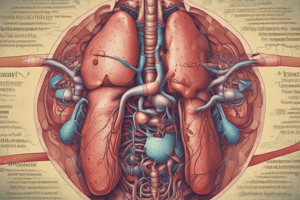Podcast
Questions and Answers
Which of the following is NOT a stigmata of liver disease related to the hands?
Which of the following is NOT a stigmata of liver disease related to the hands?
- Flapping Tremor
- Clubbing
- Palmar Erythema
- Hematoma (correct)
Which symptom is associated with liver disease and is primarily observed in the upper body region?
Which symptom is associated with liver disease and is primarily observed in the upper body region?
- Hepatosplenomegaly
- Caput Medusa
- Ascites
- Spider Angiomata (correct)
What is a common abdominal sign of liver disease that indicates fluid accumulation?
What is a common abdominal sign of liver disease that indicates fluid accumulation?
- Hepatosplenomegaly
- Ascites (correct)
- Caput Medusa
- Hemorrhoids on PR
Which of the following symptoms associated with liver disease indicates a potential hormonal imbalance?
Which of the following symptoms associated with liver disease indicates a potential hormonal imbalance?
Flapping tremor, a symptom of liver disease, is also known as what?
Flapping tremor, a symptom of liver disease, is also known as what?
Which autoantibodies are typically positive in autoimmune hepatitis?
Which autoantibodies are typically positive in autoimmune hepatitis?
What is a distinct histological finding in primary biliary cirrhosis?
What is a distinct histological finding in primary biliary cirrhosis?
Which symptom is commonly associated with primary biliary cirrhosis?
Which symptom is commonly associated with primary biliary cirrhosis?
What complication is associated with non-alcoholic steatohepatitis (NASH)?
What complication is associated with non-alcoholic steatohepatitis (NASH)?
Which screening test should be conducted annually for patients with cirrhosis to check for hepatocellular carcinoma?
Which screening test should be conducted annually for patients with cirrhosis to check for hepatocellular carcinoma?
What is the primary cause of liver damage in primary biliary cirrhosis?
What is the primary cause of liver damage in primary biliary cirrhosis?
Which condition is most likely to present with normal alkaline phosphatase levels?
Which condition is most likely to present with normal alkaline phosphatase levels?
Which condition is characterized by the symptoms of lethargy and itching, and is frequently seen in middle-aged women?
Which condition is characterized by the symptoms of lethargy and itching, and is frequently seen in middle-aged women?
Flashcards are hidden until you start studying
Study Notes
Stigmata of Liver Disease
Hands
- Palmar Erythema: Reddening of the palms, indicative of increased estrogen levels and liver dysfunction.
- Clubbing: Enlargement and rounding of the fingertips, potentially linked to chronic hypoxia, often seen in liver disease.
- Dupuytren's Contracture: Thickening and shortening of the palmar fascia leading to finger flexion, associated with liver cirrhosis.
- Leukonychia: White nails, which can signal liver disease or hypoalbuminemia.
- Flapping Tremor: Involuntary tremors of the hands (asterixis), reflecting metabolic disturbances in hepatic failure.
Head/Upper Body
- Jaundice: Yellowing of the skin and sclera due to increased bilirubin levels, a sign of liver dysfunction.
- Spider Angiomata: Small, spider-like blood vessels visible under the skin, commonly associated with liver cirrhosis and estrogen excess.
- Gynecomastia and Scant Body Hair: Breast tissue enlargement in males and reduced hair growth due to hormonal imbalances related to liver failure.
- Scratch Marks: Often a result of itching due to bile salt accumulation, commonly seen in liver disease.
Abdomen
- Ascites: Accumulation of fluid in the abdominal cavity, often due to portal hypertension and liver cirrhosis.
- Hepatosplenomegaly: Enlargement of the liver and spleen, frequently a result of liver disease.
- Caput Medusa: Distended veins around the umbilicus, indicative of portal hypertension.
- Hemorrhoids on PR: Swollen veins in the rectal area due to increased pressure from portal hypertension.
- Small Testes: Can indicate hormonal changes or dysfunction associated with liver disease, particularly in males.
Autoimmune Hepatitis
- Characterized by positive ANA and anti-smooth muscle antibodies.
- Elevated bilirubin and ALT levels with normal alkaline phosphatase, distinguishing it from primary biliary cirrhosis.
- Common symptoms include tiredness, anorexia, right upper quadrant pain, and cushingoid facies without exogenous steroid use.
- Presents with signs of liver disease.
- Pathological findings include piecemeal necrosis and lymphocyte infiltration of liver tissue.
- Treatment involves immunosuppression and potentially liver transplant.
- Complications mirror those associated with chronic liver disease.
Primary Biliary Cirrhosis
- Marked by elevated alkaline phosphatase and positive antimitochondrial antibodies.
- Results from chronic granulomatous inflammation damaging intralobular bile ducts.
- Frequently associated with other autoimmune conditions such as thyroid disorders, rheumatoid arthritis, Sjögren's syndrome, and systemic sclerosis.
- Biopsy reveals granulomas rather than piecemeal necrosis.
- Causes bile excretion issues, leading to malabsorption of fat-soluble vitamins and symptoms of portal hypertension.
- Common presentation includes lethargy, itching, increased alkaline phosphatase, often in middle-aged women.
- May lead to hyperlipidemia.
- Important to consider in patients with existing autoimmune diseases who present with liver dysfunction.
Non-Alcoholic Steatohepatitis (NASH)
- A prevalent cause of elevated liver function tests.
- Commonly associated with metabolic syndrome, characterized by obesity, hyperlipidemia, and diabetes.
- Roughly 20-30% of patients may progress to cirrhosis.
- Management through weight loss and control of lipid levels and diabetes may slow disease progression.
Hepatocellular Carcinoma
- Key risk factors include Hepatitis B and C infections, cirrhosis of various etiologies, and exposure to Aspergillus flavus toxin.
- Annual screening for alpha-fetoprotein is recommended for patients with cirrhosis; ultrasound studies are warranted if levels are elevated.
- Less than 15% of cases are resectable at the time of diagnosis.
Studying That Suits You
Use AI to generate personalized quizzes and flashcards to suit your learning preferences.




